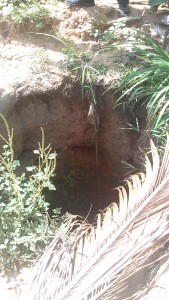 It was a big hole. It was a really big hole. I’ve never seen anything like it.
It was a big hole. It was a really big hole. I’ve never seen anything like it.
When I last left Benjamin, we were trying to drill a well. We have a great school and orphanage there. And they had a well that had serviced all the children for decades. Hundreds of children drank from this well everyday. And the well went dry.
When I left we were trying to drill a new well. It was the second attempt. It was also dry. And so were the third and fourth times too. I got to go to Benjamin again this week. It was thrilling to see all of the children there getting a good education. Benjamin is an area in Haiti full of orphans and poverty. And the CRF work there provides such a source of happiness for people who could so easily lose hope. But what about the water?
I went back to the old well. It still had a pump, and every once in awhile—water would still come out of it. But it was very infrequent and absolutely polluted. So I asked them what they were going to do. They took me across the road and showed me the hole of holes. It was their hope for a new well. The hole was about ten feet wide. And it was around 120 feet deep. But here is the kicker—it was dug by hand! Because of the remote area, they couldn’t get anyone to come back to this area that had a rig. So they just started digging. When they reached about 40 feet, Alfred Princilma (our CRF director) fell into the hole. He broke both of his legs and had to be hospitalized for a long time. And then they just kept digging. And there is still no water. I have never seen a hand dug well this deep. I didn’t know what to tell them to do. Should they keep digging? Should they stop before someone gets hurt again?
So I asked them where they currently got their water. The old well only put out periodic pumps of polluted water. The four new wells were dry and covered up. The hand dug gigantic hole was full of hope but no water. So they took me on a ten- minute walk to a little opening in the ground. Every once in a while some water would come out of this hole. And all the people of the town would wait for the surge. When it happened there was usually enough water to fill a bucket or two. Then they would wait ten to fifteen minutes for the next little flow of water. And this was it. This was the source—not only for the school but also for the whole community.
They asked me what to do. I wasn’t sure. They told me that they wanted to keep digging. But they also told me that if they hit water that they didn’t have the money to put casing on it or a pump. But thinking of people lowering themselves on a rope that was dangling on a stick gave me immense fears. If we did hit water, it would take a few thousand dollars to get it to the point of being a place to fulfill the community’s thirst. I figured readers of this story would be happy to send in the money to get it working once water was hit. But how do you tell someone to keep digging when it is so dangerous? But how do you tell someone not to do it when you look across the road and see all the children? These are the kinds of choices most of us never face. But the people of Benjamin have no other choice. So I know their answer. They will keep digging.

